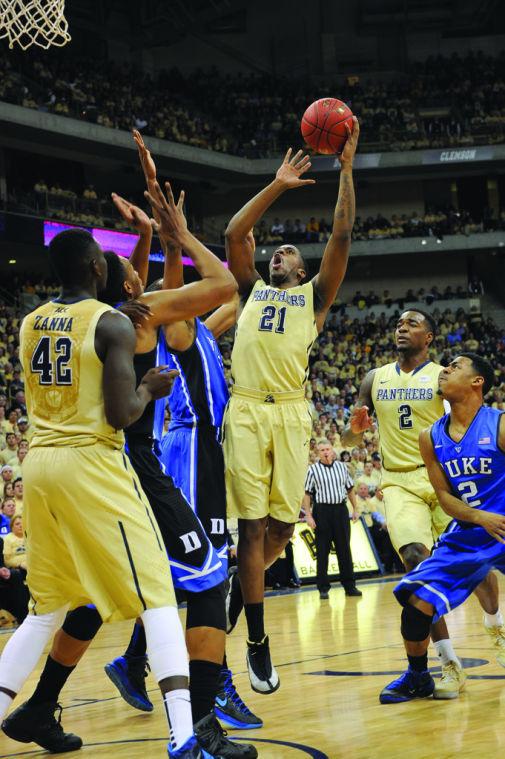Students play basketball ticket system
January 28, 2014
For fans of Pitt basketball, last night’s game against Duke may have been the most highly anticipated home game all year. For other students, it provided an easy way to make a quick profit.
During the days leading up to the game, students sold their tickets — normally sold online by Pitt’s Athletic Department for $5 each — through Facebook and other methods for prices ranging from $20 to more than $100. Tip-off for the game took place 7 p.m. Monday. Doors opened for the game at 4 p.m.
Ryan Foley, a sophomore majoring in health information management, said he and his friends split the cost of a $70 ticket so an additional friend could attend the game. Foley said he knew a friend from class who was selling a ticket, so he exchanged money for the ticket in class.
If demand for a game is high enough, such as for last night’s Duke game, the Athletic Department normally awards the tickets based on a lottery system through which students who previously attended more games than others have a better chance of receiving a ticket. Students who do not receive a ticket through the lottery process often resort to purchasing tickets from those students who did.
In the days leading up to most big-ticket basketball games, student Facebook groups — including graduating class pages and a page titled “Free and For Sale,” through which students buy and sell items — buzz with posts from students trying to swap cash for tickets. This was the case for last night’s Duke game.
Typically, a student comments or messages a suggested price to another student, and once the two parties agree on a fair deal, they meet at an agreed-upon location to exchange the printed ticket for cash. Students could also email an electronic copy of their ticket and coordinate a later time to exchange money.
In the Oakland Zoo, seating is determined on a first-come, first-served general admission basis. As a result, Foley and his friends landed a spot near the front of the line of eager fans at the Petersen Events Center by 5:30 p.m. on Sunday waiting to claim their seats for last night’s game. The group slept overnight in the Petersen Events Center lobby to secure seats at the front of the Zoo. Foley said that his spot in line would influence his willingness to purchase a resold ticket to enter the game.
As it stands, the Pitt Athletic Department has measures in place to combat students reselling tickets to other students. Justin Acierno, assistant athletic director for ticket sales and operations, said the name on each ticket, the name on the student’s University ID card and the name that appears on security staff’s scanners upon scanning the ticket barcode must match.
Because of this policy, tickets cannot be transferred between students. But students weigh their options, and some choose to take the risk.
“Based on the Syracuse game last year, I would be reluctant to use a resold ticket if I was at the back of the line,” Foley said. “The craziness is gone then, and [security] would check your ID more [closely]. At the front of the line, it can be too crazy for that.”
Acierno said the rules the Athletic Department has put in place aim to reward students who have accrued loyalty points by attending men’s and women’s basketball games. He said the Athletic Department hasn’t pursued disciplinary measures against students attempting to use another student’s ticket to enter games in the past and did not know if the department would penalize such actions in the future.
Another tactic students sometimes use is the alteration of names that are printed on tickets via image-manipulation software so that they will match students’ IDs. Students also sometimes sell multiple copies of the same ticket. In both of these cases, multiple tickets will carry the same barcode, which is assigned to just a single student. Because of this, only the first person to have the barcode scanned will be able to enter the game — all others will be denied admittance by the security scanners.
Acierno said that to his knowledge, he is not aware of any student who had achieved admittance to attend basketball games in the Petersen events Center with a re-sold ticket..
Security staff denied Foley’s friend admission at the door because the barcode on his ticket didn’t scan. But Foley said the hiked ticket price — $70 — would have been worth it if his friend got into the game.
“You would remember this game for the rest of your life,” Foley said via text message from the line at the Petersen Events Center.
Acierno said he’d be receptive to a change in the system to allow students to transfer tickets to one another if students expressed interest.
“If there’s a consensus that they’d like some flexibility, we’re always open to listening to new ideas from the students,” Acierno said.
Acierno added that many systems the Athletic Department implements now are “student-driven.”
“We didn’t come up with the loyalty points and lottery system on our own,” he said. “This is all from working with the students.”
Although Foley said he would be willing to pay increased amounts for tickets to big games, he disagrees with the morality of students profiting from other students.
“It is absolutely unethical,” he said. “Their intentions are purely to make money. They should help their school out and go instead of trying to make a quick $100.”
Foley said he is okay with students reselling the tickets, but has an issue with students who profit from reselling by charging more than the ticket’s face value.
Nour Shahab, a junior majoring in psychology, said although she disagrees with students profiting from ticket sales, she, too, paid extra to get one.
“I really don’t think reselling tickets is right,” Shahab, who paid $30 for a student ticket, said. “Students pay $5, and it is unfair, especially if student buyers have no intention of going to the game.”
Shahab said getting into the game with a resold ticket was her main concern, rather than the University’s policy on reselling tickets.
“I just wanted to get into the game,” she said. “I didn’t want to spend all this money and still not get into the game.”
But security staff turned Shahab away at the door when she tried to present her resold ticket because the ticket wouldn’t scan.
“It’s frustrating because I spent the night at the Pete, and so I wasted so much time,” she said via text. “They told me my ticket was denied and that I had to leave.”
But for some, the business deals are a wise operation.
Andrew McDonald, a senior majoring in economics, said he was was not awarded a ticket during the initial lottery phase, but he still planned to bargain his way to game admission.
In an effort to attend the game without breaking the bank, he purchased two tickets — one for $25 and one for $35 — and then resold one of the tickets for $60. He kept the other ticket for himself, ultimately breaking even in the process.
“I got turned down at first [by security staff],” McDonald said. “But then I went and got the guy’s ID who I bought the ticket from and then got in.”
McDonald said he had no issue reselling student tickets to other students to make a profit.
“In college, you can never pass up an opportunity to make a little money,” McDonald said. “There is no such thing as price gouging if there is a market for it. I think that bigger games should cost more to get into instead of having a lottery system.”
McDonald, like Foley, said there are times when security does not check tickets closely enough, and as a result he has never felt compelled to alter a ticket.
“[Security staff] never pay enough attention to the ticket or ID to know that the ticket wasn’t mine,” he said. “Getting caught with a doctored ticket would probably bring more consequences than using a ticket that wasn’t mine.”
Last night’s contest against Duke marked one of the games that every fan would circle on his or her calendar at the start of the season, and ticket prices reflect that. According to StubHub, lower level club seats were sold for more than $1,000.
Although student tickets are only $5 for students who are granted ticekts, Foley said system revisions may need to occur to make reselling at higher prices more difficult.
“I know a lot of kids with lots of loyalty points who did not get tickets,” Foley said. “I also know people who request tickets just to resell them. If you want a ticket, you should be able to get one.”



